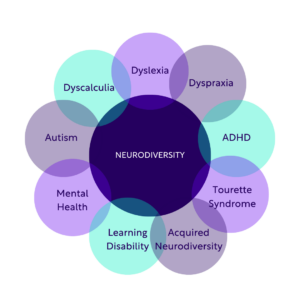How can businesses support neurodiversity in the workplace?
Because neurodiverse individuals think somewhat differently to those considered ‘neurotypical’, this often means the things around the individual need to be slightly different too. Therefore, employers might need to adapt the working environment to accommodate any needs.
To support neurodiversity in the workplace, management training is therefore key. A study by Neurodiversity in Business and Birkbeck, University of London found that 65% of neurodivergent employees “experience a lack of understanding of neurodiversity by managers and decision makers – signalling a need for wider education and support”.
Therefore, it’s important that both the strategic and operational functions of a business understand neurodiversity and are sufficiently prepared to provide the required support.
The training could cover the following topics:
- How Neurodiversity can benefit a business
- The important place it has in business
- Training on different types of neurodiversity
- How to support appropriately
- How to spot signs of neurodiversity
- How to unlock the potential of a neurodiverse employee and set tasks appropriately—along with the correct communication for that employee (not the manager)
It’s also a good idea to make sure neurodiversity is a discussion point in EDI meetings and discuss ways to raise awareness in the business and discuss how you might create support networks for both neurodivergent individuals and managers to discuss ideas and challenges.
Because neurodiversity could be a sensitive topic for some neurodiverse individuals, it’s also helpful to look at ways people can come forward with ideas and suggestions anonymously or confidentially, such as suggestion box or employee survey.
Based on your discussions, it will become easier to support neurodivergent employees by making various accommodations.
This will vary depending on a range of factors, but common adjustments might include:
- Flexible working shifts
- Work from home days for deep focus tasks
- Noise cancelling headphones to help with sensory overload
- Screen filters
- Text to speech options
- Provide fidget devices or under desk peddles
There are also lots of activities which you could consider running within the business that would benefit both neurodiverse and neurotypical employees alike. For example, mindfulness sessions might be especially helpful for employees with ADHD but would also have huge health benefits for everyone, including neurotypical employees.

